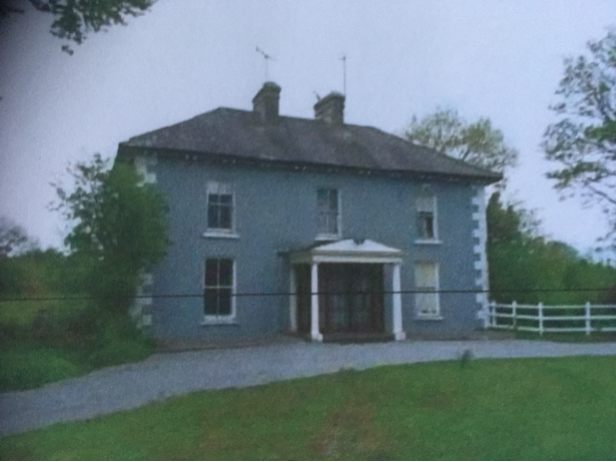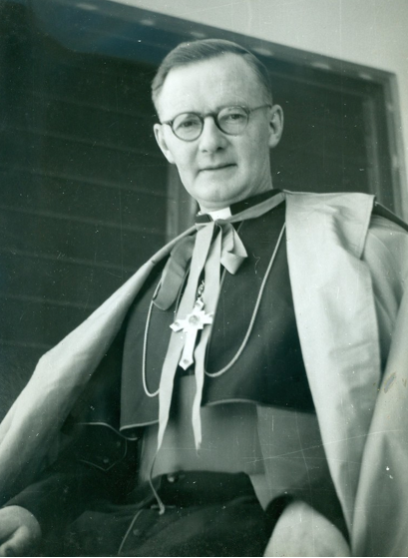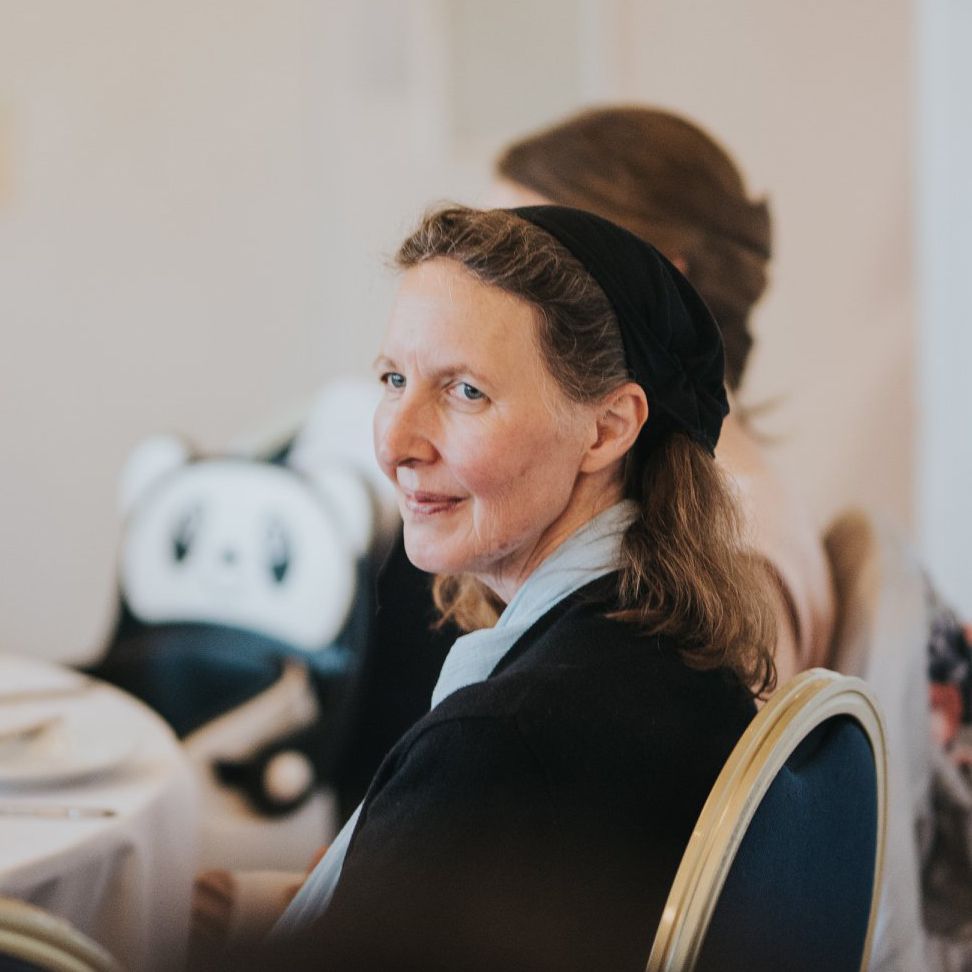21st July - No Letter
Secret diary: Wed.12 miles SSE Corboy Brockville. Bks. hee (?). square Cahirconlish caut going on
Official diary (21st July): I went by car to a house tenanted by DR CORBOY at CAHIRCONLISH. The name of this house was BROOKVILLE. Nobody was at home as the family had gone away on a holiday. A Sinn Fein Court was being held in the village at the time I arrived (A man was endeavouring to obtain a divorce from his wife) I stayed here till Sunday 25th July.
Location: Dr Corboy’s House Brookville Caherconlish
CHTL was moved to Brookville or sometimes 'Brookfield' house which was owned by a Dr. Corboy who was conveniently away on holiday at the time. One of the doctor’s family was three and a half year old James Corboy: who later became the much loved Bishop James Corboy in the Society of Jesus or Jesuits. James Corboy was born at Brookville, Caherconlish, county Limerick, 20 October 1916. He was born, the third of six children, to Dr John and Josephine (nee Coman) Corboy in Caherconlish, Co Limerick. He was educated at the Crescent and Clongowes Woods College, he entered the society in 1935 and was ordained in 1948. He was consecrated Bishop of Monze, Zambia. It was there that he was buried on the request of the local people. The Irish Times - Source


Dick O'Connell of the Caherconlish Battalion 'had already decided on a secure location for holding the general. Doctor Corboy, the dispensing Doctor in the Caherconlish area, had gone on holidays to Kilkee. O'Connell had free use of the house and the general was lodged there for a number of days.'
p368 The War of Independence in Limerick, Thomas Toomey
Major General Lucas had been captured by the Cork Volunteers in June, 1920, and they had passed him on for safe keeping to the fellows in Clare. It was some time later still that the Clare men Mick Brennan, Paddy Brennan and Mick Hehir handed him over to us. I put them up at Dr. Corboy's house in Caherconlish. Dr. Corboy was at the time on holidays in Kilkee but he allowed us the use of his house for this purpose. We remained there for, I think, three days. Then it was rumoured that the British authorities knew of Lucas' presence there. We were afraid of a raid, so we arranged to have him moved to another place.
BUREAU OF MILITARY HISTORY, 1913-21. STATEMENT BY WITNESS DOCUMENT NO. W.S. 656 Richard O’Connell, Member of Caherconlish Irish Volunteers 1914 Adjutant, 3rd Battalion) O/C. 5th Battalion) Mid-Limerick Brigade. O/C. Brigade Flying Column)
There was an understanding between many IRA sympathisers and the brigades that the civilians would turn a blind eye, leave a key under the mat, or unofficially provide some assistance as long as it didn't lead to their arrest.
Company Captain Morgan Portley, of the 5th Battalion, Mid Limerick Brigade, in his Witness Statement filled in the details of CHTL's sojourn at Dr Corboy's residence:
General Lucas, O/C. British forces in Fermoy, was captured in the summer of 1920, and responsibility for his custody was passed on to the different areas in which he was detained. Our battalion (5th Battalion, Mid Limerick Brigade) took over General Lucas from the 3rd Battalion, Castleconnell. Dr. John Corboy, Dispensary Doctor, Cahercdnlish, was away on holidays and we decided we would keep General Lucas and the officers guarding him in the dispensary residence in Caherconlish.
Michael Brennan, 0/C. East Clare Brigade, was in charge of General Lucas's guard. The prisoner and his guards were fixed up comfortably and some local people were allowed in to play cards with him.
BUREAU OF MILITARY HISTORY, 1913-21. STATEMENT BY WITNESS. DOCUMENT NO. W.S. 1559. Witness Morgan Portley, Kishikirk, Caherconlish, Co. Limerick. Identity. Company Captain, Ballybricken, Co. Limerick. Battalion Adjutant.
The general's card playing skills; especially the speed he dealt the cards in spite of his missing digits; filled his fellow players with admiration. Playing cards in the trenches and behind the line in smoke-filled taverns; fuelled with lots of alcoholic beverages and fine food; with laughter and witty banter bouncing round the room as the rapid fire of cards were dealt across a table; calculating brains making swift decisions reading the imperceptible visages of opponents, was all replicated here in Ireland.
This was CHTL in his element. He knew how to have a good time with the lads. No doubt word soon got round and men, in the know, queued up to try their luck against the three finger dealing general and enjoy the craic.
It was not only CHTL's card skills that the volunteers admired - his sense of fair play and honour also impressed them:
Lucas was a very decent man and he proved that afterwards. While he was in custody with us, I went into the room to him one day and I saw on the mantelpiece a letter with Dr. Corboy's name and address on it. He was, therefore, aware of the place he was held in and the name of the person that owned it, but he never gave that away afterwards. He knew us well and he never gave any of us away.
BUREAU OF MILITARY HISTORY, 1913-21. STATEMENT BY WITNESS DOCUMENT NO. W.S. 656 Witness Richard O’Connell, Member of Caherconlish Irish Volunteers 1914 Adjutant, 3rd Battalion) O/C. 5th Battalion) Mid-Limerick Brigade. O/C. Brigade Flying Column
Although CHTL did pass on the name of the person who owned the house, Dr Corboy, and where it was situated, he somehow prevented a full scale round up of the men and women who were complicit in his imprisonment. Dr Corboy was away on holiday at the time and therefore couldn't be held responsible for what happened in his home in the meanwhile. As Joseph noted in his Witness statement:
It was quite easy for General Lucas to know where he was lodged. We stayed in Bunratty Castle, Clare Castle and other large dwelling-houses, where there was writing material bearing the address of the house. In one house there was a rowing scull, bearing the name of an old Oxford “Blue”.
BUREAU OF MILITARY HISTORY, 1913-21 STATEMENT BY WITNESS DOCUMENT NO. W.S. 388 Witness Mr. Joseph Good, “Raisin", Riverdale, Butterfield Ave., Dublin. Identity Member of Irish Volunteers London 1914 -; Member of Kimmage Garrison 1916.
Certain names were mentioned in the official report, possibly ones that were already known to the authorities or would not get their relatively innocent bearers into trouble. For example, it could be argued that certain families might have been put under a lot of pressure to co-operate with Sinn Fein and had housed the missing general under duress. CHTL's unequivocal assertion that he was 'treated as a gentleman by gentlemen' and those who held him were 'delightful people' negated the need for retribution, as he had no complaints about his hosts. He had to walk the fine line between doing his duty as an officer in the British army and also doing his duty in upholding his word of honour to those who had held him. He was reluctant to betray those wonderfully hospitable and kind individuals who had done all they could to make his enforced stay in Ireland as pleasant as possible. He recognised their genuine goodwill and the sacrifices they made for the cause they believed in.
During his captivity, CHTL had several conversations with Volunteer Joseph Good on the subject of what the general would or would not disclose on his release:
Lucas was very frank. He told me that if he was released or exchanged for one of our men in British custody he would not again take service in Ireland. He seemed to be embarrassed by the intimate knowledge he had of us personally and of the houses and places Where he had been kept prisoner. He said to me: "In the event of my release I shall be asked questions. I know you all personally and know that you carry arms."
I said: "That is our right and we ask no defence of it".
"Anyhow", he said: "it is unlikely that you fellows will be caught alive". I thought that very nice of him, but I reported our conversation to Mick Brennan. Mick saw what Lucas was driving at and told me to follow up that conversation. Later I said to Lucas: "Many of the houses we have taken you to have sheltered you and us out of their innate hospitality. They would have treated private soldiers similarly. We are conscious of this and hope that they will not suffer as a result of their kindness".
Lucas answered by saying: "I shall not say where I have been lodged", and in this he kept his word.
BUREAU OF MILITARY HISTORY, 1913-21 STATEMENT BY WITNESS DOCUMENT NO. W.S. 388 Witness Mr. Joseph Good, “Raisin", Riverdale, Butterfield Ave., Dublin. Identity Member of Irish Volunteers London 1914 -; Member of Kimmage Garrison 1916.
In the end CHTL's official report gave enough detail to satisfy the braying of his angry and humiliated military superiors but not enough to justify hauling in and incarcerating suspects.
In his eyes CHTL fulfilled his duty to all as much as he possibly could.
The Source of the Whiskey
One of the joys of writing these posts has been the information that we’ve received from those reading the letters. Dickie Power has contributed the following:
"I am the last of those whose fathers took part in the troubles and my father often spoke of the Gen and his genteel incarceration.In fact I am looking forward to the account of his stay in the doctors house Caherconlish where we subsequently lived… Reputedly I was born in the same room as the bishop .The co-incidences don’t end there like him I attended Crescent College Limerick among the lesser known old boys were Richard Harris and Terry Wogan…
I understand from Tom Toomey that it was Dick O’Connell who was his main gaoler while in Caherconlish. I’m sure the whiskey was procured from O’Connell’s public house which was nearby.
O’Connell’s was burned down by the auxies due to Dick O’Connell’s involvement in the Dromkeen ambush.The story had a happy ending O’Connell’s had been a very modest single story thatched pub.When the truce and settlement happened the British paid for damage done and O’Connell’s ended up with a fine two story slated building.
Subsequently my aunt married Dick’s brother John who ran the family business and she lived there for around 40 years
Dick O’Connell took the treaty side became a TD before moving to Dublin where he became a successful (and wealthy) horse trainer winning many of the big races in Punchestown…Dr Corboy died in Dec 1933 while his wife Josephine ( a woman of great fortitude) soldiered on until 1966"
What a useful guard Dick O’Connell must have been with his family connections. CHTL would have greatly enjoyed the fact that O’Connell could source his whiskey conveniently close by!

